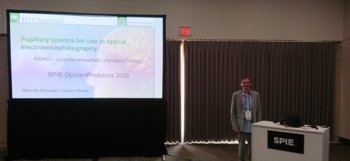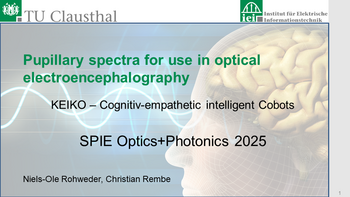From August 3rd to August 7th, the annual Optics + Photonics conference took place in San Diego, CA, USA, one of the most important in the field. More than 3,500 people joined the conference at harbour-based San Diego Convention Center. The SWZ-coordinated research project "Kognitiv-emphatisch intelligente Kobots" (KEIKO) was present with the subproject 1, "Remote Sensors for Empathetic Cobots". PhD student and SWZ member Niels Rohweder travelled to San Diego to present his research results in two talks, one of them as an invited paper.
The first presentation, “Low-cost Face Tracking Using ONVIF-based Surveillance Cameras,” focused on affordable solutions for face tracking, while his other talk, “Pupillary Spectra for Use in Optical Electroencephalography,” delved into the cutting-edge of brain activity measurement. The latter talk was selected as an invited feature, to present to the interested attendees the core of his PhD work.
Reflecting on the experience, Niels Rohweder shared, “It was a great experience in beautiful San Diego, and an honor to receive the 'invited' status. I met colleagues from around the world and gained a wealth of new ideas to further my work.”
That work is his PhD thesis: A way to remotely record brain activity data from pupillary oscillation spectra. Part of his research is, among other things, the ultra-high-resolution pupilometer he constructed, able to resolve pupillary oscillations down to the nanometer-scale. These novel technologies and approaches to brain activity measurement will be used in the KEIKO project, in whose context the research happened. KEIKO is an interdisciplinary research project, coordinated at the SWZ, including not only the TUC (IEI, IFI, SWZ), but also departments at the Universities of Göttingen, and Duisburg-Essen. The project is supported by the federal state of Lower Saxony. It aims to create a cobot that is able to adapt to the user's physical and mental states, creating a true human-centric experience. A way to remotely gauge human mental states, such as might be possible using brain activity measurements, is therefore critical. Other subprojects within KEIKO deal with AI-based action prediction, psychological markers for mental states such as fatigue, or VR-based simulations.
"This is a valuable recognition for our project," says project speaker Prof. Dr. Christian Rembe. "It underscores the importance and relevance of the research we are conducting."
The KEIKO project which is funded by the state of Lower Saxony using SPRUNG (project number 76251-1337/2022) will conclude in 2026.
Further information

